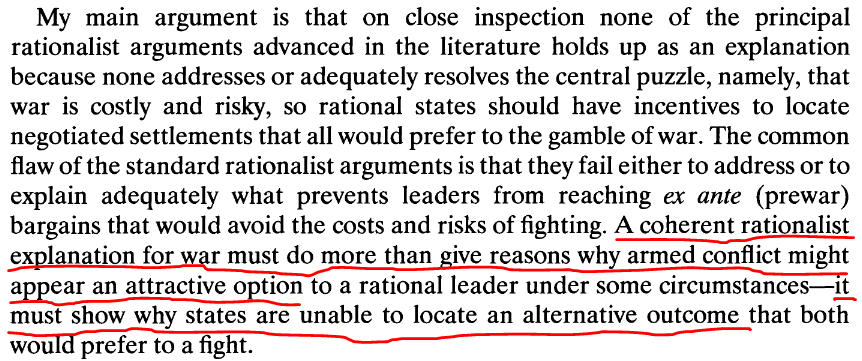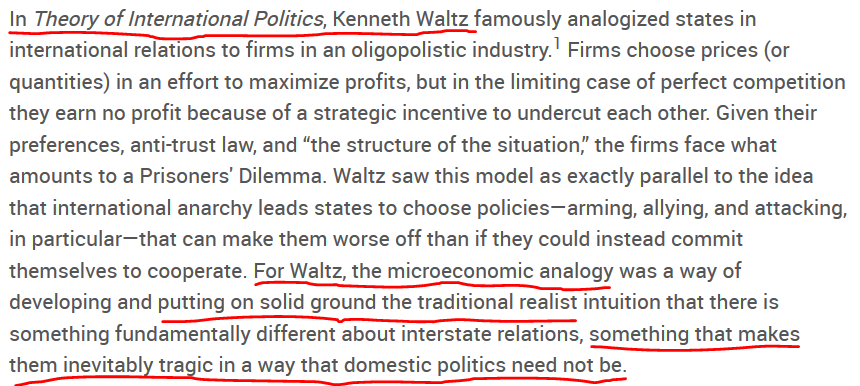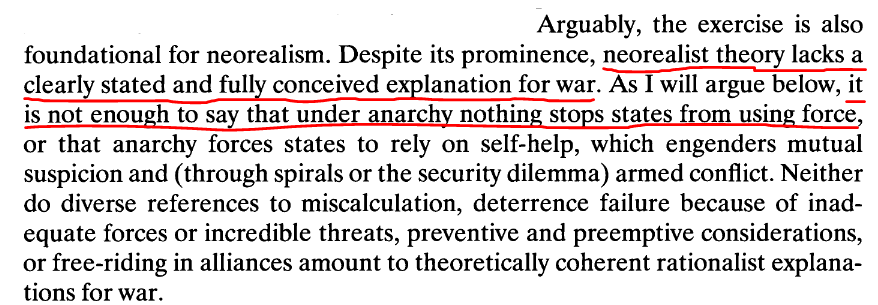
Don't call it "Neorealism". Call it "Rationalist".
Time to #KeepRealismReal and talk about Jim Fearon's "brand" of realism.
[THREAD]
Time to #KeepRealismReal and talk about Jim Fearon's "brand" of realism.
[THREAD]

I’m of course referring to Fearon’s seminal (i.e. Everyone cites, but nobody reads) paper: "Rationalist Explanations for war"
cambridge.org/core/journals/…
cambridge.org/core/journals/…
I know what you might be thinking, “wait, that piece is about Neorealism?”
Yep! Not only that, but it’s a defense of Neorealism.
Yep! Not only that, but it’s a defense of Neorealism.
This really shouldn’t come as a surprise. This piece was essentially chapter 1 of his dissertation... 

...and Kenneth Waltz -- Mr. Neorealism himself -- was his dissertation advisor.
amazon.com/Theory-Interna…
amazon.com/Theory-Interna…
Though Fearon admits in the below interview that Waltz was a fairly "hands off" advisor...
e-ir.info/2013/12/16/int…
e-ir.info/2013/12/16/int…
...Fearon's connection to Waltz would continue. Here he gives a lecture in honor of Waltz (and the lecture if VERY realist in its theme: why no world government?)...
...and here is an @AnnualReviews interview by Fearon of Waltz regarding Waltz's career.
annualreviews.org/doi/abs/10.114…
annualreviews.org/doi/abs/10.114…
Oh, and if you look at Fearon's most recent @IntOrgJournal article on the "costs of anarchy" (very neorealist in its theme)...
cambridge.org/core/journals/…
cambridge.org/core/journals/…
I'll say more about that 2018 paper in another thread. For now, back to Rationalist Explanations for War!
A key motivation for the paper is to give neorealism a clearly articulated explanation for war. As I covered in this earlier #KeepRealismReal thread, Waltz doesn't really offer a theory of war but a theory about the general tendency of the "system"
https://twitter.com/ProfPaulPoast/status/1401139475783335942
Such an explanation must explain not only why states would choose to fight but also why states can't reach a deal that avoids the costs of war. 

In other words, war is a failure of bargaining: cutting a deal that both prefer to war. After all, most wars end in deals, not the victors standing over the completely annihilated losers (even 🇯🇵 cut a deal with 🇺🇸 to end WWII in the Pacific). 

As it turns out, Waltz suggested this exact argument in Theory of International Politics when he turns to the analogy of labor strikes: they are costly and the sides should have reached a deal to avoid them (this is from ToP): 

And Waltz, in turn, was drawing on an idea put forward by Blainey (and economic historian) in the early 1970s...
amazon.com/causes-War-Geo…
amazon.com/causes-War-Geo…
...and Thomas Schelling in the early 1960s
hup.harvard.edu/catalog.php?is…
hup.harvard.edu/catalog.php?is…
Fearon provides three reasons for why a deal that avoids war can't be reached. More precisely, he identifies three "mechanisms":
1) I think you're lying
2) I think you'll cheat
3) The item can't be shared/split
1) I think you're lying
2) I think you'll cheat
3) The item can't be shared/split
Of the three, even Fearon admits that the third is pretty weak. It is "less compelling" than the other two. Later, Robert Powell would argue that #3 is essentially a special case of #2
cambridge.org/core/journals/…
cambridge.org/core/journals/…
As for the other two, they are more commonly referred to as
1) Incentive to misrepresent/information problems
2) Incentives to defect/commitment problems
1) Incentive to misrepresent/information problems
2) Incentives to defect/commitment problems
Let's assume that two states, A and B, are bargaining over a piece of land. Rather than showing a picture of the land... 

Why can't A and B reach an outcome in the "Bargaining Range"?
- Perhaps A thinks B is lying about its capability or resolve and, hence, A mistakenly pushes too hard on the issue
- Perhaps A thinks B is lying about its capability or resolve and, hence, A mistakenly pushes too hard on the issue

- Or Perhaps A thinks B will renege on the deal in a couple years time (perhaps because B is growing more powerful). 

In other words, this second explanation points to preventive war motivations -- which are critical to the security dilemma (a core realist idea)
https://twitter.com/ProfPaulPoast/status/1391016679036030976
Though in the case of Fearon, he gives more precision to when security dilemmas will actually kick in 

What are the situations that can give actors an incentive to renege? Well, it's largely due to anarchy. This suggests that the incentive is quite prevalent. 

Of course, notice the use of the words "might" and "could".
This is why, despite Fearon's claim to be doing otherwise, the paper really doesn't provide mechanisms for exactly why shooting actually starts.
This is why, despite Fearon's claim to be doing otherwise, the paper really doesn't provide mechanisms for exactly why shooting actually starts.
As Robert Powell writes in his 1999 book: "The models are very spare, and, indeed, almost certainly too spare to explain any particular outcome in any degree of specificity."
press.princeton.edu/books/paperbac…
press.princeton.edu/books/paperbac…
Hence, "Rationalists Explanation for War" truly is a piece of Neorealism...in that it, like other pieces, can only offer a probabilistic explanation for war, not a specific one.
As Gartzke said, "War is in the Error Term."
cambridge.org/core/journals/…
As Gartzke said, "War is in the Error Term."
cambridge.org/core/journals/…
So rather than nailing down why bullets actually start flying, perhaps Fearon's seminal piece did something else: it made a bunch of folks approach war as a Neorealist without knowing they were doing so 🤔
[END]
[END]
• • •
Missing some Tweet in this thread? You can try to
force a refresh


















